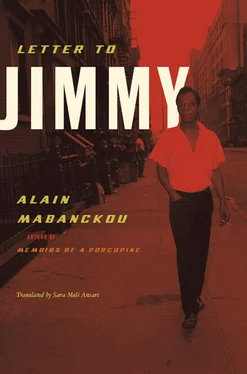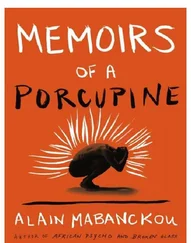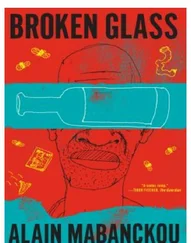Being saved by Samuel marks you, and you bring this up in No Name in the Street. The figure of this half-brother would run through Go Tell It on the Mountain and again in Tell Me How Long the Train’s Been Gone, then in Just Above My Head. . The importance of the brother is magnified, his love nearly Christ-like, his arms protective, pulling you to life while the water is trying to swallow you whole. .
In the end, isn’t life, too, a vast wave that threatens to wash away the home if the father shuts his family out? Because you shoulder nearly the entire burden of father of the house, you become the one to whom the other children turn. You are a savior in your own right. Most of your biographers describe the same image of you from this period: a book in one hand, while tending to one of your brothers or sisters with the other.
David Baldwin knows that there is nothing more he can do. He knows that he cannot slow down your rush toward independence, nor distract your gaze from the page any more than he can stop your frequent visits to the neighborhood public library, or your increasing distance from religion. For him this is a failure. Until this point, to his great joy, you still belonged to the movement of young preachers, and had preached on countless occasions. You were preaching from the age of fourteen in Baptist churches. It was what David Baldwin wanted. This paternal wish comes through in the introduction to Go Tell It On the Mountain: “ Everyone had always said that John would be a preacher when he grew up, just like his father. It had been said so often that John, without ever thinking about it, had come to believe it himself.”
At fourteen years of age, you are considered a good preacher, and very inspired. You become aware of the power of the word. From high on the pulpit, the faith of an entire population hangs from your lips. These black women, men and children are convinced that the words you speak come through your mouth from the Almighty. You know the Bible by heart, and the rhetoric and poetry you breathe into your sermons further inspire the audience, won over by your preaching. 15
Until that time, the church had been your refuge. You believe it is the only place that can save you from the cruelty of the street. You think of how, in Harlem, police officers stop you, search you; they try to get a rise out of you by yelling insults about your background, the sexuality of black men, even leaving you unconscious in an abandoned lot. It is a violence from which age will not protect you, since already at thirteen, when you are making your way down Fifth Avenue toward the public library on 42nd Street, a policeman shouts at you, “Why don’t you niggers stay uptown where you belong?” 16
Young people your age are wrong, you believe, not to seek shelter in the house of the Lord. You encounter a number of these young, lost souls, given to debauchery, on a daily basis. It is mostly the metamorphosis of the girls and boys you see in choir practice at church that stuns you. They grow and their features change. The girls “give off heat,” their chests swell and their hips become round. The boys drink, smoke and discover the pleasures of the flesh. You imagine what you will be like, what you will become when your body has changed, too, and when your voice becomes deeper. You are wracked with anxiety: will you find yourself in the company of “the most depraved individuals of this world?” 17Your biggest fear is the same one that grips every other black adolescent in the neighborhood: the fear of ending up like a stray dog, no higher on the social ladder than your father: “School therefore began to seem like a game that was impossible to win, so boys stop attending and started looking for work.” 18
Three years more and you would be long gone from the church. Your mind is elsewhere. You can only think of one thing: “to be an honest man and a good writer.” 19
•••
The reasons for your break with the church? You outline them in The Fire Next Time. You begin to understand that religion as it is will not help you obtain love from your fellow man, at least not as far as people of color are concerned. The Bible itself sews a seed of doubt in your mind: “People, I felt, ought to love the Lord because they loved Him, and not because they were afraid of going to Hell. I was forced, reluctantly, to realize that the Bible itself had been written by men, and translated by men out of languages I could not read, and I was already, without quite admitting it to myself, terribly involved with the effort of putting words on paper.” 20
Your disappointment is immense. You saw how churches operated, whether they were white or black churches. You saw that certain ministers became rich at the expense of the faithful, who are always asked to give more: more faith, more charity work, more alms. From the faithful, everything is squeezed out, down to the “last cent,” you write. You now know that when you preach, Bible in hand, sweat dripping from your forehead, you are no longer held by the force that used to lift your spirits and persuade the poor that a better world was in store; a Heaven where a spot, even a numbered one, was reserved for them on the right-hand side of the Lord. So on this poor, attentive flock you cast a gaze of compassion and guilt: compassion for the degradation of their daily lives, and guilt for being among those who ignore that reality. You feel as though you are leading them astray: “. . when I faced a congregation, it began to take all the strength I had not to stammer, not to curse, not to tell them to throw away their Bibles and get off their knees and go home and organize, for example, a rent strike.” 21
How much longer will you be able to hold on?
At 17, you make your decision. And it is a permanent one, since you feel your grievances grow and grow against the Lord you have been serving for three years. You discover that instead of helping you find the peace you desire, religion throws you into profound loneliness. When called upon, you are nothing more than a puppet, a kind of messenger who goes against the best interests of his people. They are hungry, and you promise them riches in another world. They have no home, and you assure them that God will provide for them.
Faced with such realizations, your criticisms of the Holy Book are unforgiving. This book had helped brand an eternal curse onto the skin of the black man: “I was aware of the fact that the Bible had been written by white men. I knew that according to many Christians, I was a descendent of Ham, who had been cursed, and that I was therefore predestined to be a slave.” 22
•••
Your “hatred” toward David Baldwin evolves into forgiveness the day that you see him dying on his hospital bed. He is a battered man, almost unrecognizable. Do you have to continue to be angry with him? With some perspective, you declare: “I imagine one of the reasons people cling to their hates so stubbornly is because they sense, once hate is gone, they will be forced to deal with pain.” 23
At the time of his death, on July 29, 1943, you become aware of the affection you felt for this being. As if looking for reasons to love him, you flip through the family photo album: your stepfather dressed to the nines to preach on a Sunday. It is a sublime image, you think. And you imagine David Baldwin “naked, with war-paint on and barbaric mementos, standing among spears.” 24The impenetrable forehead, those serious features. It is his bitterness that you do not try to explain to yourself, the bitterness that he would take to the grave, “because at the bottom of his heart, he really believed what white people said about him.” 25
When he is hospitalized, you discover that he has a serious case of tuberculosis. But you know that the enemy is not tuberculosis, that it is something else incurable, invisible, far from the diagnosis the doctors have issued from high on their pulpit. The thing that takes David Baldwin away is the “disease of his mind,” the one that has been eating away at him from the inside for years: “. . the disease of his mind helped the disease of his body to destroy him. For the doctors could not force him to eat, either, and, though he was fed intravenously, it was clear from the beginning that there was no hope for him.” 26
Читать дальше












